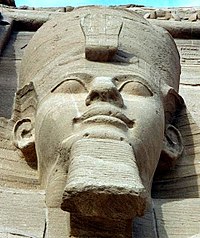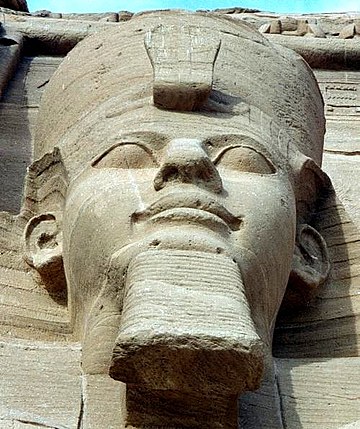Ramzes II bio je treći vladar XIX egipatske dinastije. Jedan od najznačajnijih faraona u veoma dugoj istoriji Egipta je svakako Ramzes II (poznatiji kao Ramzes Veliki) koji je nakon smrti oca Seta i preuzeo vlast nad egipatskim carstvom kojim je vladao punih 67 godina. Puno ime bilo mu je Usermaatre-setepenre Ramzes ("Ra je snažan u pravednosti - Raov izabranik Ramzes"). Vladao je (1290-1224. pne.) u vrijeme velikog procvata, ali koji je bio popraćen stalnim ratovima.
Kratke činjenice
Prethodi:
Seti I |
Faraon Egipta
19. dinastija |
Slijedi:
Merneptah |
| Ramzes II |
Ramzes Veliki
alternativno Ramses ili Rameses |
 |
| Vladavina |
1279–1213. pne. |
| Nomen |
Ramesses meryamun
Ramzes (Re ga je stvorio), voljen od Amuna.[1] |
| Zlatni Horus |
Userrenput-aanehktu
Bogat godinama, veluik u pobjedama.[2] |
| Nebty naziv |
Mekkemetwafkhasut
Zaštitnik Egipta koji savija strane zemlje.[2] |
| Horusovo ime |
Kanakht Merymaa
Snažni bik, voljen od pravde i istine.[2] |
| Supružnik |
Henutmire, Isetnofret, Nefertari
Maathorneferure |
| Potomci |
Khaemweset, Merneptah,
Amun-her-khepsef, Meritamen,
v. također: Popis djece Ramzesa II |
| Otac |
Seti I |
| Majka |
Kraljica Tuya |
| Grob |
KV7 |
Najvažniji
spomenici |
Abu Simbel, Ramesseum,
hramovi u Luxoru i Karnaku |
Zatvori
Kako Egipat, tadašnja velesila bliskog istoka, nije mogao izbjeći stalno ratovanje s neprijateljima na sjeveru i jugu, Ramzes je od svoje dječačke dobi do duboke starosti vodio mnoštvo uspješnih ratnih pohoda. Najteža Ramzesova bitka zbila se kod grada Kadeša kad je zamalo izbjegao smrt ili zarobljavanje od strane Hetita. Ramzes je dovršio veliki hram u Karnaku, te izgradio kolosalne hramove u Abu Simbelu i palaču Rameseum. Njegove žene Neferati, Isis-nefret i dvjestotinjak prilježnica rodile su mu 96 sinova i 60 kćeri.
Među njegovom djecom Egipćani su osobito poštovali princa Haemvaseta koji je bio vrhovni svećenih Ptaha u Memfisu. Haemvaset je bio poznat kao mudrac, a o njemu govore priče s papirusa iz kasnog razdoblja. Budući da je doživio duboku starost (94 godine) nadživio je 12 svojih sinova, a naslijedio ga je trinaesti - Merenptah. Mumija Ramzesa II pokazuje da je bio iznimno visok (oko 192 cm) što je znatno iznad prosjeka za njegovo doba kad su prosječni muškarci bili visine oko 160 cm. Zbog svoje upečatljive osobnosti i uspješne vladavine obično ga nazivaju Ramzes Veliki.
Bibliografija
- Aidan Dodson & Dyan Hilton, The Complete Royal Families of Ancient Egypt, Thames & Hudson (2004)
- James Putnan, An introduction to Egyptology, 1990
- Von Beckerath, Jürgen. 1997. Chronologie des Pharaonischen Ägypten, Mainz, Philipp von Zabern.
- Peter J. Brand, The Monuments of Seti I: Epigraphic, Historical and Art Historical Analysis, Brill, NV Leiden (2000)
- David O'Connor & Eric Cline, Amenhotep III: Perspectives on his reign, University of Michigan Press, 1998
- Tyldesley, Joyce. 2000. Ramesses: Egypt's Greatest Pharaoh. London: Viking/Penguin Books
- N. Grimal, A History of Ancient Egypt (Oxford: Blackwell, 1992)
- Ania Skliar, Grosse kulturen der welt-Ägypten, 2005
- Wolfhart Westendorf, Das alte Ägypten, 1969
- Michael Rice, Who's Who in Ancient Egypt, Routledge, 1999
- Alberto Siliotti, Egypt: temples, people, gods, 1994
- Bob Brier, The Encyclopedia of Mummies, Checkmark Books, 1998
- Can. Assoc. Radiol. J. 2004 Oct;55(4):211-7, PMID 15362343
- The Epigraphic Survey, Reliefs and Inscriptions at Karnak III: The Bubastite Portal, Oriental Institute Publications, vol. 74 (Chicago: University of Chicago Press, 1954)
- RPO Editors. „Percy Bysshe Shelley : Ozymandias”. University of Toronto Department of English. University of Toronto Libraries, University of Toronto Press. Arhivirano iz originala na datum 2006-10-10. Pristupljeno 18. 09. 2006.
Literatura
- Hasel, Michael G. 1994. “Israel in the Merneptah Stela,” Bulletin of the American Schools of Oriental Research 296., pp. 45–61.
- Hasel, Michael G. 1998. Domination and Resistance: Egyptian Military Activity in the Southern Levant, 1300–1185 BC. Probleme der Ägyptologie 11. Leiden: Brill. ISBN 90-04-10984-6
- Hasel, Michael G. 2003. "Merenptah's Inscription and Reliefs and the Origin of Israel" in Beth Alpert Nakhai ed. The Near East in the Southwest: Essays in Honor of William G. Dever, pp. 19–44. Annual of the American Schools of Oriental Research 58. Boston: American Schools of Oriental Research. ISBN 0-89757-065-0
- Hasel, Michael G. 2004. "The Structure of the Final Hymnic-Poetic Unit on the Merenptah Stela." Zeitschrift für die alttestamentliche Wissenschaft 116:75–81.
- James, T. G. H. 2000. Ramesses II. New York: Friedman/Fairfax Publishers. A large-format volume by the former Keeper of Egyptian Antiquities at the British Museum, filled with colour illustrations of buildings, art, etc. related to Ramesses II
- Kitchen, Kenneth Anderson. 1982. Pharaoh Triumphant: The Life and Times of Ramesses II, King of Egypt. Monumenta Hannah Sheen Dedicata 2. Mississauga: Benben Publications. ISBN 0-85668-215-2. This is an English language treatment of the life of Ramesses II at a semi-popular level
- Kitchen, Kenneth Anderson. 1996. Ramesside Inscriptions Translated and Annotated: Translations. Volume 2: Ramesses II; Royal Inscriptions. Oxford: Blackwell Publishers. ISBN 0-631-18427-9. Translations and (in the 1999 volume below) notes on all contemporary royal inscriptions naming the king.
- Kitchen, Kenneth Anderson. 1999. Ramesside Inscriptions Translated and Annotated: Notes and Comments. Volume 2: Ramesses II; Royal Inscriptions. Oxford: Blackwell Publishers
- Kitchen, Kenneth Anderson. 2003. On the Reliability of the Old Testament. Michigan: William B. Eerdmans Publishing Company, ISBN 0-8028-4960-1.
Više informacija Značajni stari Egipćani ...
Zatvori


